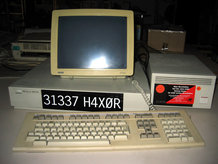Protect your data for a million years
Opinion: Just how do you keep your important data safe?

Sign up for breaking news, reviews, opinion, top tech deals, and more.
You are now subscribed
Your newsletter sign-up was successful
Every now and again, someone on a discussion board will ask "How do I keep my important data safe? Not just safe for a few months or years, but forever. Long enough for someone like Tony Robinson to dig it out of a ditch and reconstruct my life."
Hard disks eventually fail, DVDs rot and devices become obsolete as operating systems change. What time capsule can possibly withstand the slow, crushing grasp of time itself? I'll tell you:
Your computer.
Whatever computer you currently own, no matter how asymptotically it approaches the zenith of technical advancement, it will eventually become obsolete. But this doesn't matter because by then you will have replaced it with another computer. Which will also be "your computer". So Your Computer isn't a physical device, it's an abstract concept - like a football team or a nation - and abstractions can be immortal.
Better still, the physical computer that currently represents the abstract concept will always be faster and more capacious than its predecessor. So the contents of the hard disk from your old computer will always fit inside the hard disk in your new one one, with room to spare. Put it in a folder called "Old Stuff" and after that, your normal backup procedure (Time Machine, if you have a Mac; crossing your fingers and looking the other way, if you use a PC) will protect that data.
As you clamber up the rock face of technology, upgrading from one computer to the next, your Old Stuff folder will gradually get more and more nested. If you open Old Stuff\Old Stuff\Old Stuff\Old Stuff\OldStuff on mine, you'll reach the files from my 120MHz Pentium PC from 1993 (which was too old to allow spaces in file names). That hard disk was just 40Mb. And as long as hard disks continue to get bigger, this process can continue indefinitely. At each iteration, the Old Stuff folder consumes between 10 and 20 per cent of my hard disk, which is a pretty trivial tax considering how cheap disk space is.
Much cheaper than a climate-controlled underground vault containing working models of every computer from the late 80s onwards.
Sign up for breaking news, reviews, opinion, top tech deals, and more.